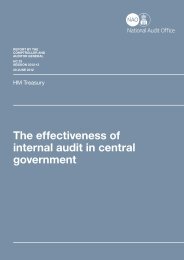Full report (pdf - 1148KB) - National Audit Office
Full report (pdf - 1148KB) - National Audit Office
Full report (pdf - 1148KB) - National Audit Office
You also want an ePaper? Increase the reach of your titles
YUMPU automatically turns print PDFs into web optimized ePapers that Google loves.
4 Appraisal and sustainable developmentSummaryIntroduction1 The <strong>National</strong> <strong>Audit</strong> <strong>Office</strong> has prepared this briefing at the request of theEnvironmental <strong>Audit</strong> Committee. The briefing gives a high-level landscape overview ofoptions appraisal processes across the government's decision-making landscape, witha focus on incorporating environmental and social factors in these processes.2 The briefing is structured as follows:Part One outlines the landscape of decision-making across the range ofcentral government activities together with the formal appraisal processeswhich have developed, including the impact on the UK of EU requirementsfor appraisal;Part Two sets out the guidance on appraisal, its central emphasis on costbenefitanalysis, approaches to monetisation of non-financial impacts, andother ways wider impacts may be taken into account.3 This briefing was compiled on the basis of desk-based research of publiclyavailable documents including previous <strong>National</strong> <strong>Audit</strong> <strong>Office</strong> <strong>report</strong>s and briefings onoption appraisal and regulation, central guidance from the Better Regulation Executive(BRE) and the Treasury, material from departmental websites, and other published<strong>report</strong>s. It was supplemented by a limited number of interviews with staff in selectedgovernment departments,Main findingsAppraisal in decision-making across government4 The fundamental objective of appraisal is to ensure that government decisionsare based on a rational consideration of options and their associated costs andbenefits.5 The landscape of decision-making across government is complex, reflecting themany different ways in which government operates to influence society. Departmentsmust comply with statutory appraisal requirements and with government requirements,as set out in HM Treasury's Green Book and other related guidance. Formal appraisalsystems have grown up in three main areas - the Impact Assessment process whichapplies mainly to regulatory interventions, the Business Case process, which appliesto spending proposals, and most recently Tax Information and Impact Notes, whichhave been introduced to address the impacts of new taxation proposals.

















